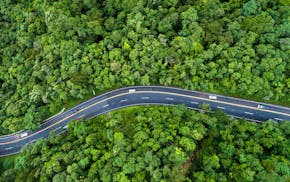
Opinion editor's note: Star Tribune Opinion publishes a mix of national and local commentaries online and in print each day. To contribute, click here.
•••
So long as I can remember, I have known no more reliable source of delight than traveling, in the widest and loosest sense of the word.
I don't refer mainly, or even particularly, to traveling in the sense of visiting far-flung locales and taking in exceptional sights. I mean merely being in motion, passing through the world.
It's a curious consolation, this pleasure of passing through, as difficult to describe as a scent. But it has proved durable, maybe even increasing with age. It is also, I think (and hope), not unique to me.
My earliest memories of this delectable "scent" take me back to my semirural boyhood and to visions of long, lazy walks with friends along railroad tracks. There was, of course, the familiar magic of the rails, stretching off into an infinite elsewhere, connecting us to mysterious distances by slender tethers of steel. But all that was much enriched for us boys in those days by the rare luxury of privacy and liberation.
There weren't, the way I remember it, many places a boy could feel really independent — authentically on his own — beyond the range of adults. But the tracks were one such place. So we dutifully misbehaved there, mainly by smoking.
Yet whenever a train would go by, we'd hide our cigarettes nonchalantly behind our backs. We must have been afraid the engineer would tell on us.
It's all a measure, no doubt, of our good fortune in those bygone times. Truth is, we kids had far more day-to-day autonomy and freedom back then than children seem to have today, with their structured, supervised, safety-first lives. Yet rules, expectations and above all ideals were simple and clear in a way I don't think they are today. It was a comfort that simultaneously sharpened our hunger for the luscious liberty of the tracks.
As with most stimulants, I consumed this freedom of the road most indulgently in early adulthood. I was a hitchhiker.
Almost every summer of my college years, I left home, hearth, car and common sense behind and hit the highway with a breathtaking recklessness only those who have been there can hope fully to appreciate. And many of my baby boom contemporaries were there in those unruly years. I hitchhiked to the East Coast and the West Coast, across Canada and Europe.
Remembering those arduous and vulnerable journeys as well as I dare at my increasingly squeamish age, the recalled consciousness of passing through, of being loose upon the world, is almost too strong to bear.
It was the feeling of swimming through society as one swims through water — in contact with it, but never really connected to it or at rest in it. It was the odd, voyeuristic pleasure of seeing other people's everyday surroundings — their towns, cars, cafes, countrysides — with a stranger's probing but generous eyes. It's not unlike the kindliness of memory, which so often puts a flattering twilight glow on one's past, or the way just the right amount of distance makes city skylines and landscapes look their best.
Passing through puts that just-right distance on the world in the here and now, allowing you to see other people's "inside" as your "outside," as C.S. Lewis once put it. As a hitchhiker, meanwhile, everybody else's "outside" — the shoulders of highways, the truck stops, the wayside rest areas — became my private "inside."
Of course, an implausible cast of misfits and benefactors populated the road. I got rides from glue sniffers and church bishops, from hippie potheads and John Birchers, from AWOL sailors fleeing New York and busted gamblers fleeing Las Vegas, from car thieves and small town cops, from gruff long-haul truckers preferring even a vagabond college punk's conversation to another solitary hour of country and western sorrows.
There's nothing lonelier than the highway at dawn. It smells lonely.
All these years later, I long for summer chiefly because it accommodates my two best remaining techniques for passing through: walking anywhere and any type of boating. I've hiked glaciers and mountain trails in Alaska and wandered many whole days through Berlin, Paris and London. But the essential, transporting satisfaction of passing through can be had just strolling my suburban neighborhood.
The basic pleasure is that appreciative detachment created just by wandering by, enjoying Lewis's inside-out perspective. It's a glow that prettifies other people's yards and gardens, makes me wish they could see them that way. In a way the glow is loveliest when it is faint and you're almost not sure it's there.
From boats, the shine is often blinding. Put a canoe on a city lake, paddle along the shoreline, and the world, and your relationship to it, is giddily changed. Your familiar surroundings become novel; you're startled at how handsome and interesting they are. Your own inside becomes an outside; you are psychologically afloat and free.
Put that canoe on a river, boom along through the viscera of a city or through shadowy forests, where reeds cling to an eroding shoreline and branches overhang weedy pools, and you are again attached to the ends of the earth, emancipated from wherever you are. Like the railroad and the highway, the river connects you to everywhere and disconnects you from anywhere.
Some years back, I enjoyed several "trips" with a powerful derivative that indulged my addiction to passing through: sailing Lake Superior, especially along the deep northern wilderness coast of Ontario. This basically ruined me for regular living.
Space travel no doubt beats big-water cruising for imposing solitude and wonder, but I'm skeptical much else does. Sit near the bow of a good sized vessel, slogging through a chill fog. The immensity of the shrouded deep is never so vivid as when invisible and merely felt. The swell lifts the bow five feet and drops it, lifts the bow five feet and drops it, lifts the bow five feet and drops it — as regularly as if the lake were breathing. The joy and fear of passing through, of feeling yourself to be a wanderer, an exile, gets no stronger than this, which may be a good thing.
If it begins to seem I'm describing some kind of spiritual experience, I won't deny it. The pleasure of passing through may simply be the pleasure of perceiving life accurately. It's a matter of emotionally encountering a truth ordinarily known mainly to the intellect, and so not known very well.
We are wanderers. We are just passing through. Honesty, if not quite wisdom, may begin in feeling rootless in the world and always a bit homesick for that old infinite elsewhere I knew walking the railroad tracks.
Besides, the prettiness things of the world possess when we see them as novelties is at least as much the truth about them as the drabness they take on when they're too familiar.

'We're doing this for Gavin'
Vang: Why Minnesota should lead in banning AI nudification apps

